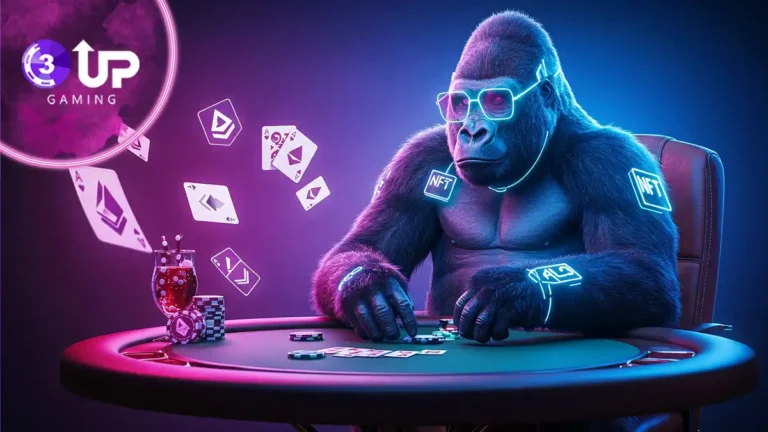How Poker NFT Characters Are Integrated into Web3 Games! Poker NFT characters are seamlessly integrated into Web3 games to create a more immersive, personalized, and economically rewarding experience. These NFTs serve as unique, verifiable digital identities for players, often with special traits or abilities that influence gameplay dynamics. Through blockchain technology, each character is stored securely on a decentralized network, ensuring true ownership and rarity. Players can use their NFT characters to enter exclusive tournaments, unlock bonus features, or gain strategic advantages within the game ecosystem.
How Poker NFT Characters Are Integrated into Web3 Games
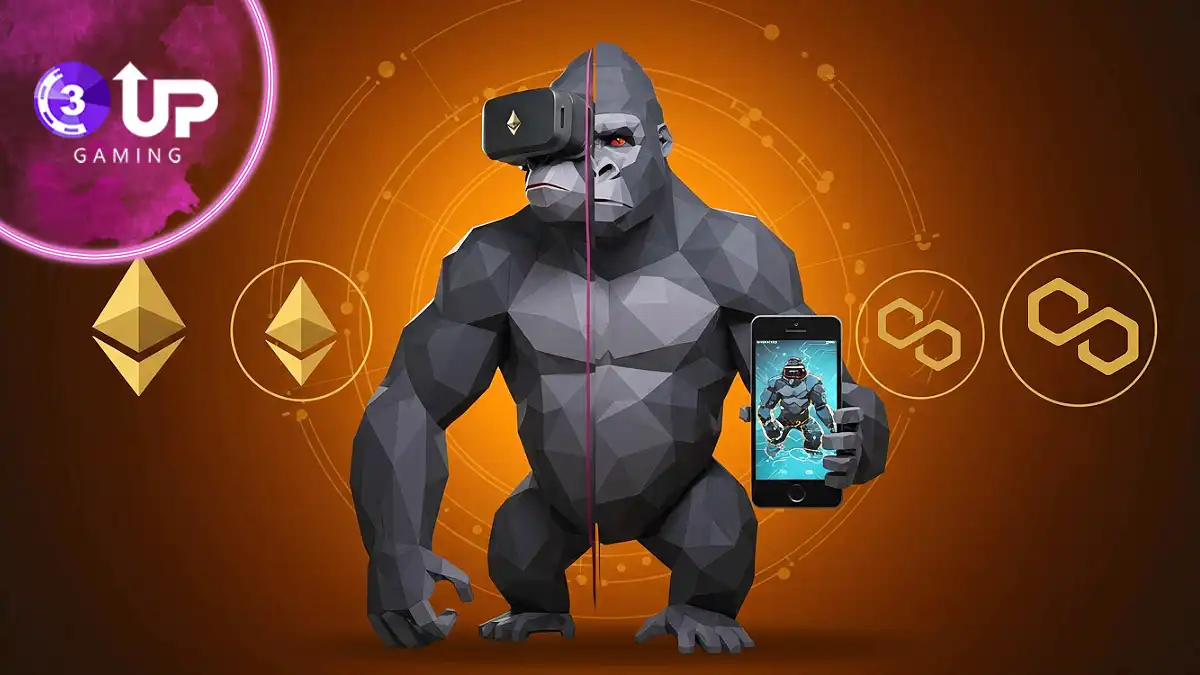
In many Web3 poker games, these characters are more than visual avatars, they’re part of a broader game economy. Smart contracts link them to player performance, reward structures, and upgrade systems. Some platforms even introduce progression models, where NFT characters level up or evolve based on gameplay success, increasing their value and utility. Interoperability is another key feature, allowing users to carry their poker NFT characters across multiple games or platforms within a shared metaverse. This integration not only deepens engagement but also transforms traditional poker into a dynamic, player-owned experience powered by Web3.
Understanding Web3 and Its Connection to NFT Characters
What is Web3
The third version of the web, a user owned, decentralized and Blockchain founded version. In contrast to Web2 in which the user’s data and monetization are controlled by platforms such as Facebook or Google, in Web3 control is restored to the user through decentralized networks and crypto protocols.
In gaming parlance that translates to revolutionary change, assets no longer have a death and life that are all in one app but are owned, upgraded or traded by the player themselves.
Web3 carries concepts like smart contracts, decentralized apps (dApps) and crypto wallets that offer new opportunities for users to interact with games without the presence of central authorities.
This allows NFT poker players to retain tangible, transferable value from one game to another and across platforms so that players can own a portion of gaming assets.
The NFT Layer
NFTs are not only Web3 gaming collectibles but also an active identity layer. Poker NFT characters are customized avatars or player representatives with on-chain stored attributes, achievements and cosmetic upgrades.
Instead of being anchored to a single game’s server, they are passports across gaming worlds, building up persistent, dynamic identities. NFTs enable interoperability and personalization: your poker player can wear a skin purchased in one platform and carry that look to another.
This multi-layered identity adds richness and social and strategic depth to the Web3 poker experience.
Understand the logic: Can Poker Bots Beat Human Professionals?
Don’t miss this: Get the Edge: Top Poker Software Sale [2025]
How Poker NFT Characters Enhance Gameplay in Web3 Environments
Immersion & Personalization
Poker NFT characters change the gamer experience for good with extremely immersive and personalized play. In normal online poker, there is a fixed avatar for the player or they are just a name. Web3 allows them to be killed and players get to use a special NFT character that is stored within the blockchain. These types of characters usually have distinct looks, backstories, voice lines, and personalities.
These avatars can be shaped over time to be more emotionally invested. Achievements or ownership history skins, emotes, badges, and styles contribute to the narrative. Individuals are players and individuals. This virtual ownership and personality aspect fuels greater immersion and leads to longer playing times.
Finally, social indicators in poker rooms can also be NFT characters. A legend or rare character may represent reputation or ability and therefore have some impact on the other players’ action at the table, altering bluffing, betting, and player psychology to some degree.
Skill Development & Meta Value
Static avatars can’t, but NFT poker characters can. Ratings, experience, and statistics of players can be written in Web3 game worlds on the character NFT itself. For instance, if your character’s win percentage on hundreds of dApps or tournaments, the statistics can potentially be written on-chain or shown through visual appearance changes.
This creates meta value: high-end characters with achievement or special characteristics are more valuable over time. They are not only game functionality but commodity that may be traded, and functionality and scarcity making them valuable in dollar terms. An excellent poker NFT character can be a highly valuable token in markets, with ability and investment value intertwined.
These titles will also grant tokens or privileged tournament entry based on your character history. This is a mix of play-to-own and play-to-earn, whereby poker no longer becomes a game of fortune but an ever-expanding universe of strategy wherein experience and identity converge.
Take control with: 3UP Gaming’s Standalone Poker: Full Control & Customization!
Explore further: Buy Poker Software: The Best Platform for Your Investment!
Integration Methods of Poker NFTs into Decentralized Games
First, here’s a Comparison of NFT Integration Techniques:
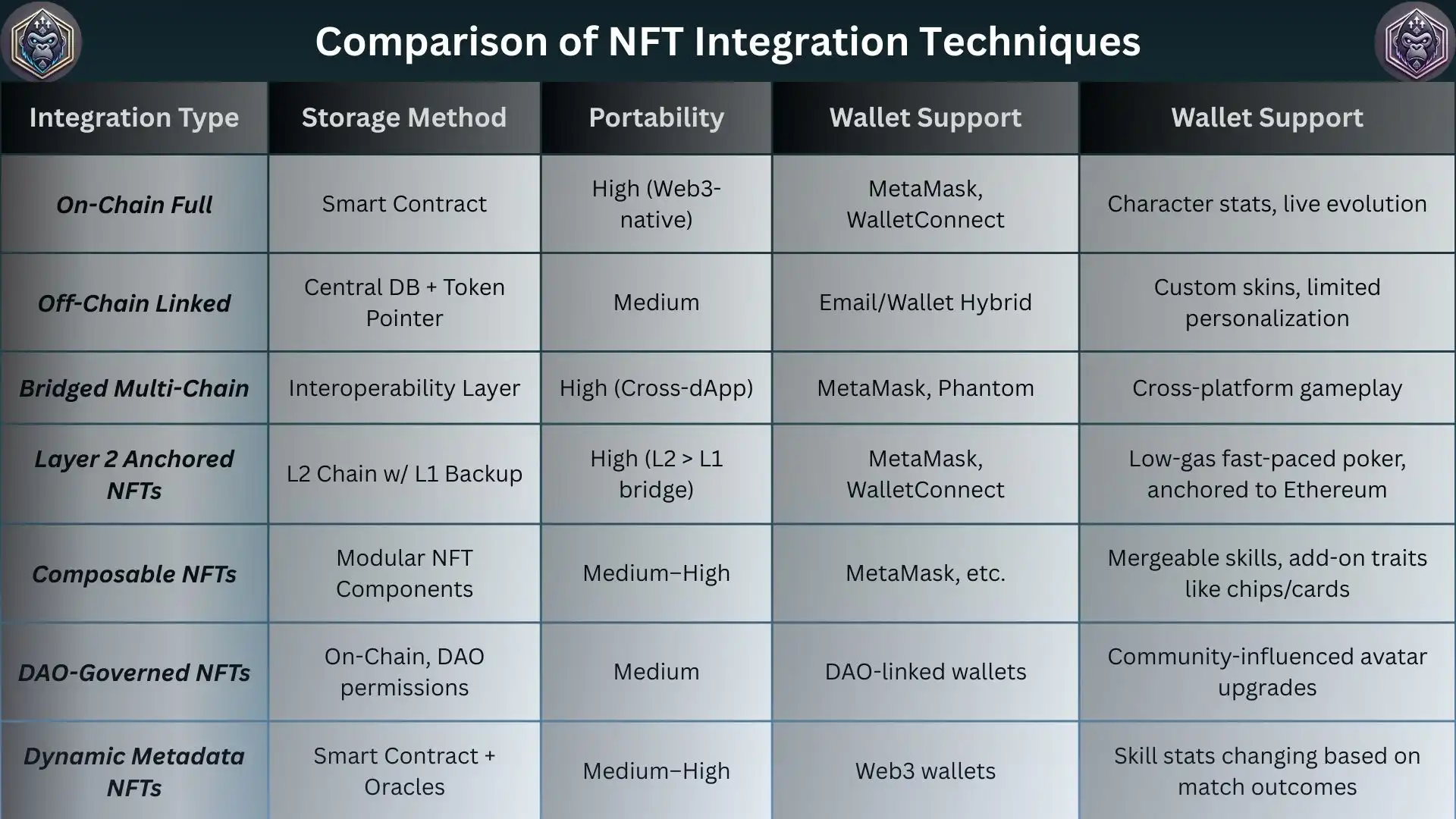
On-Chain Identity Mapping
Web3 integration is all about on-chain identity mapping. In blockchain poker games, each NFT character is associated with a wallet address so that ownership, attributes and even performance metrics of the character are stored on the blockchain.
This includes tamper-evident logs, open tracking, and verifiable ownership. NFT metadata, like skill level, custom items, and previous wins, can be placed into dynamic smart contracts by developers so that a player can have their name revealed as well as functionally associated with their play, ranking, and interactions in other players’ games.
Current deployments use soulbound tokens or tradeable NFTs to attach definitive achievements to characters and render them progressive digital passports for competitive gaming.
Cross-Game Portability
One of the most exciting possibilities of NFT integration is portability between games. NFT poker avatars, as opposed to permanent assets tied to a platform, can be taken to many other decentralized applications (dApps) with the same standards, i.e., ERC-721 or ERC-1155 on Ethereum and comparable chains.
It may participate in a Texas Hold’em game on one dApp and a Sit & Go with a theme on another, without ever altering its identity, rank, and look, with the help of interoperability layers or multi-chain bridges.
It enables the so-called “metaverse poker lifestyle” where your poker identity tags along with you, constructing and developing you in different environments. Wallet-based authentication (i.e., MetaMask, Phantom, WalletConnect) is the facilitator of this seamless experience.
Search More: Poker Software for Sale: Launch Your Online Business!
Learn how to set it up: How to Buy a Profitable Poker Site? Complete Guide!
Smart Contracts and the Role of Blockchain in NFT Integration
Here’s another for Smart Contract Capabilities by Blockchain:
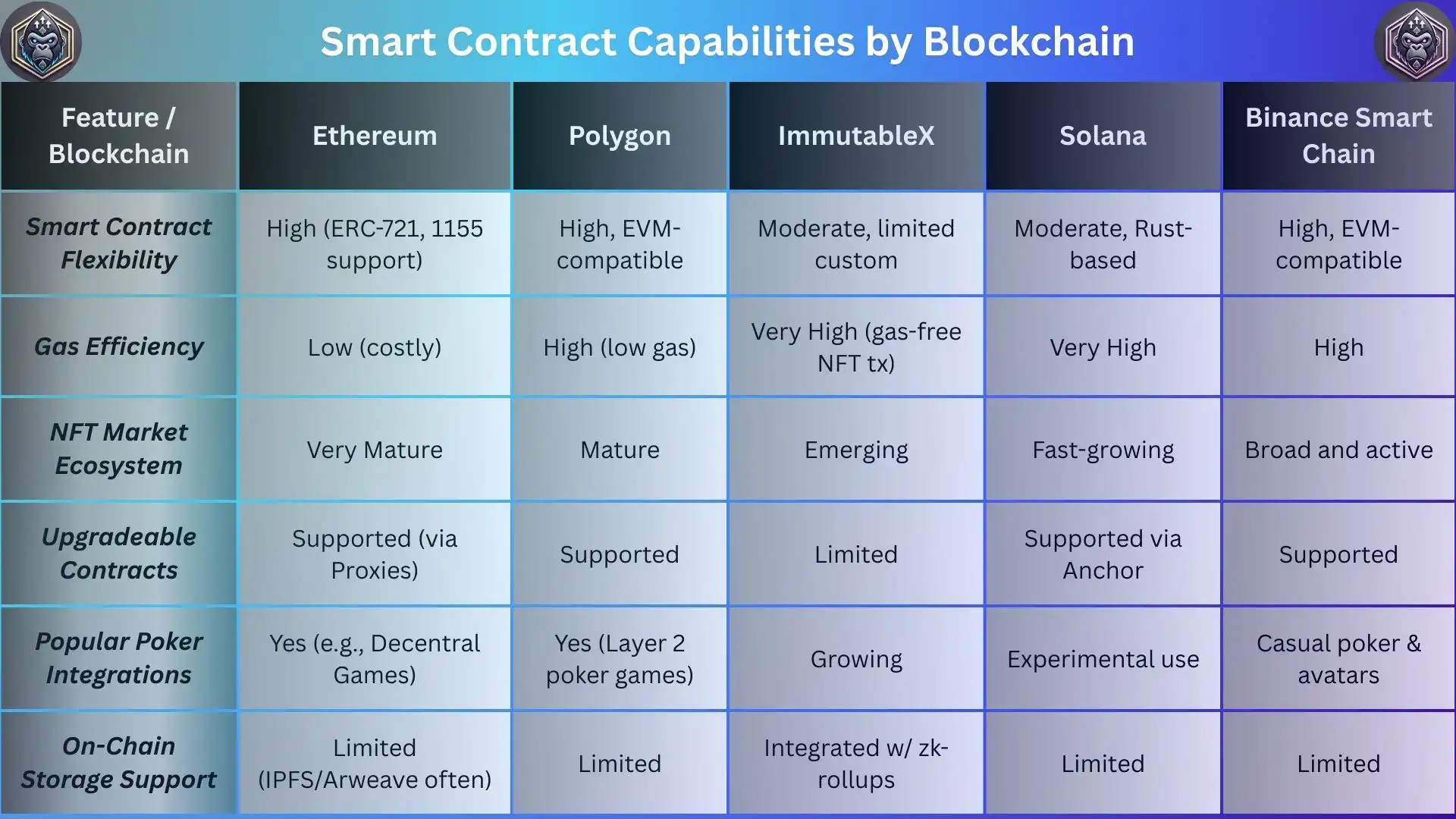
How Smart Contracts Manage Game Logic
- Smart contracts are independent scripts that run gameplay elements: character action verification, win/loss action, reward dispensation, and statistic tracking.
- Poker NFT games specify the behaviors of characters in the game universe, e.g., the actions they can perform, when they gain experience points, and how rewards function.
- Specialized poker regulations (bluff multipliers, skill chips, RNG audits) can be incorporated into the contract, and they run independently on-chain.
Immutable Ownership and Functionality
- Due to the fact that the ownership is on the blockchain and can’t be altered randomly post-creation or transfer, NFTs connected by way of smart contracts provide true ownership.
- Free functions such as freeze properties, bind to wallet, or upgrade via oracle data fall in the category of the contract shell of the NFT.
- Transparency along with autonomy come to players: there’s no one dev able to cancel, modify, or counterfeit card stats.
Benefits of Using Poker NFT Characters in Web3 Games
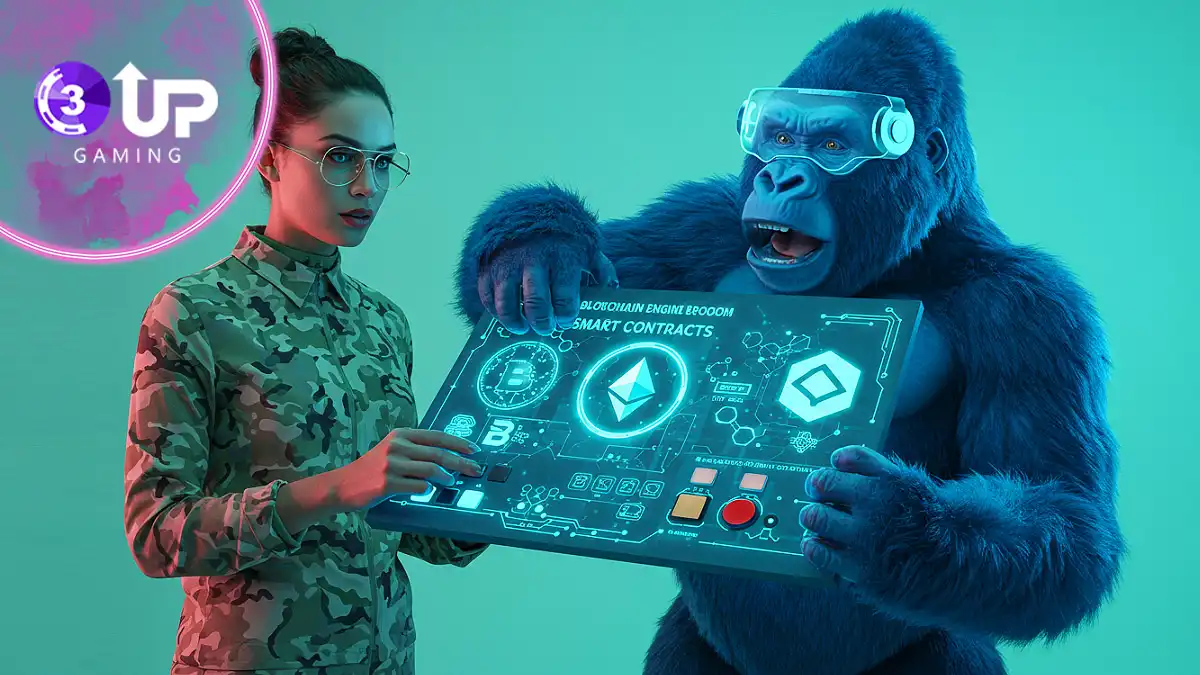
Poker NFT characters offer a new way to play through collectible ownership and simulation in realism. They are different from immutable avatars since these NFTs are still mutable cryptographically in terms of skill levels, aesthetic upgrades or rarity. They offer permanent identification across multiple platforms, a sense of immersion and status symbols for skill or dedication.
In decentralized poker environments, NFT avatars can grant expert modes, VIP status to probability maximizing tournaments or maximize certain skills (e.g. bluffing bonuses, accuracy at reading). Poker personas are resellable, tradable and rentable on secondary markets, play-to-earn. They create marketable assets.
Because they are smart contract based, the character here has immortal behavior and rules no matter what platform or game client. This means fairness, anti-cheating and traceability of the game action or upgrades in real time. Lastly, poker NFTs are both economic utility and art value and hence an incredibly strong asset class for the Web3 gaming revolution.
Discover more about: Altcoin Poker Sites: Beyond Bitcoin for Your Poker Games!
Compare this with: Crypto Poker Software: Play with Bitcoin and Altcoins!
Popular Web3 Gaming Platforms Supporting Poker NFTs
Web3 gaming has blown up in recent years and poker NFTs are at the center of that growth. Some systems like Virtue Poker or Pokerverse are solely blockchain based poker environments while others are poker as a mini-game within open world experiences.
That means NFT characters are what define player identity and competition there. You see this kind of setup in metaverses like Decentraland and The Sandbox as well as more specialized ecosystems. Each one has its own take on how to integrate, scale and design those communities. These platforms use blockchain to support not only ownership but also player activity through in-game assets, tokens and special tournaments.
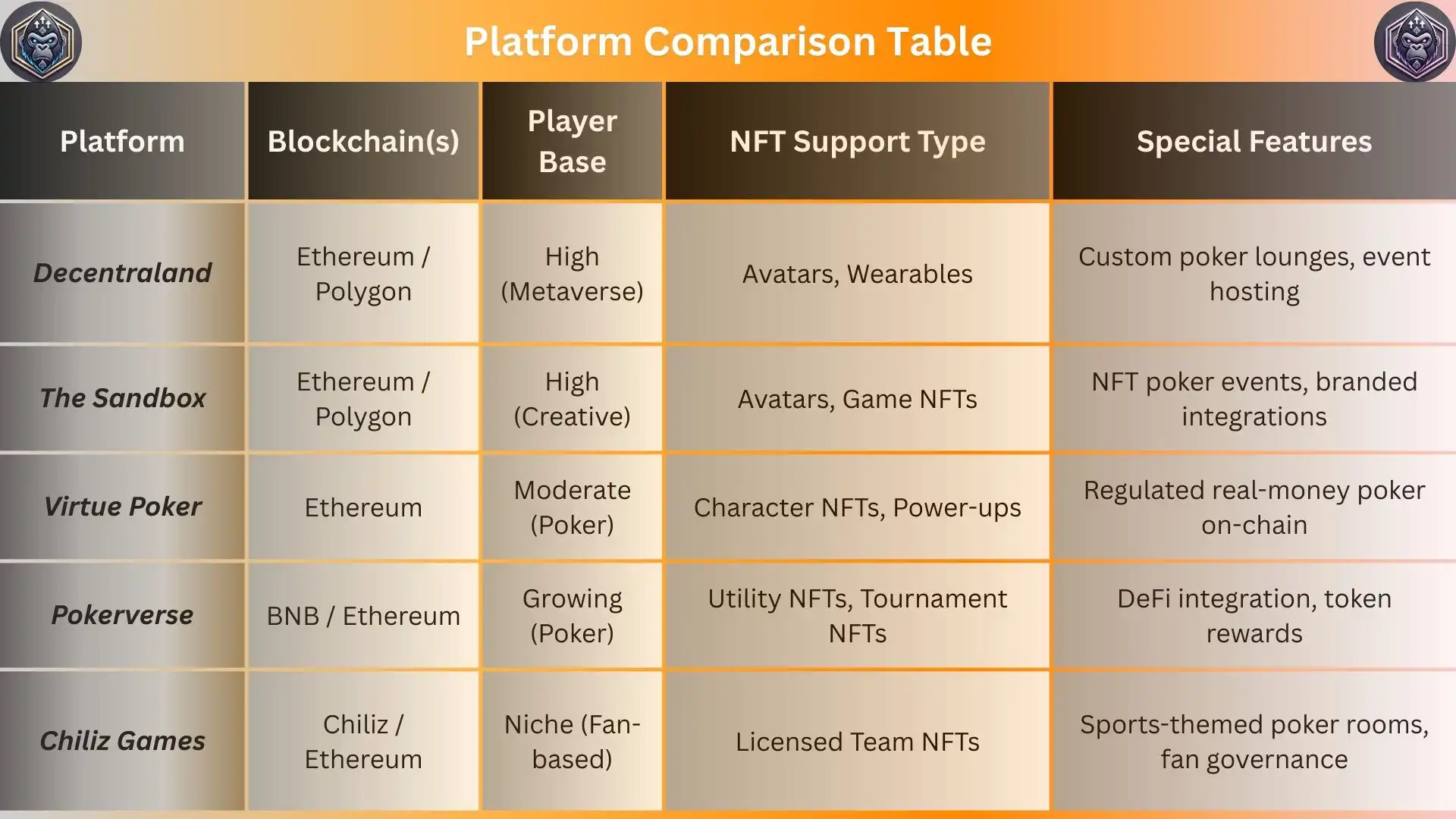
Decentraland and The Sandbox
That’s where The Sandbox and Decentraland come in: they allow users and developers to create game worlds on virtual pieces of land. Poker NFT characters can be used to access custom poker rooms, attend events or even host NFT backed tournaments. Players show off their NFT identities across games and social hubs, turning poker into a lifestyle extension within a broader social metaverse. Premium avatars, branded gear and metaverse wide reputation systems are all benefits to poker NFT holders and increase exposure and immersion. Creativity is what drives these platforms.
Specialized Poker Ecosystems
In dedicated blockchain poker platforms like Virtue Poker, Pokerverse or Chiliz powered environments you’ll find tailored gameplay mechanics, governance models and economies centered around those NFT characters. Fairness, staking models and skill based matchmaking are key there. NFT characters might hold power-ups, tier access or utility tied to native tokens. To help competitive players build long term wealth these platforms offer features like NFT staking, tournament linked incentives and on-chain leaderboard tracking.
Before choosing one of these platforms competitive players should consider blockchain costs, wallet support and community size. That’s because they vary greatly in terms of decentralization, regulation and gameplay mechanics.
Learn the difference: Top 10 Crypto Poker Platforms in 2025: Unbiased Reviews
Compare this with: Top Online Poker Software Developers: Custom Solutions for Real Money & Social Gaming!
Future Trends: How NFT Integration is Shaping the Next Generation of Poker Games
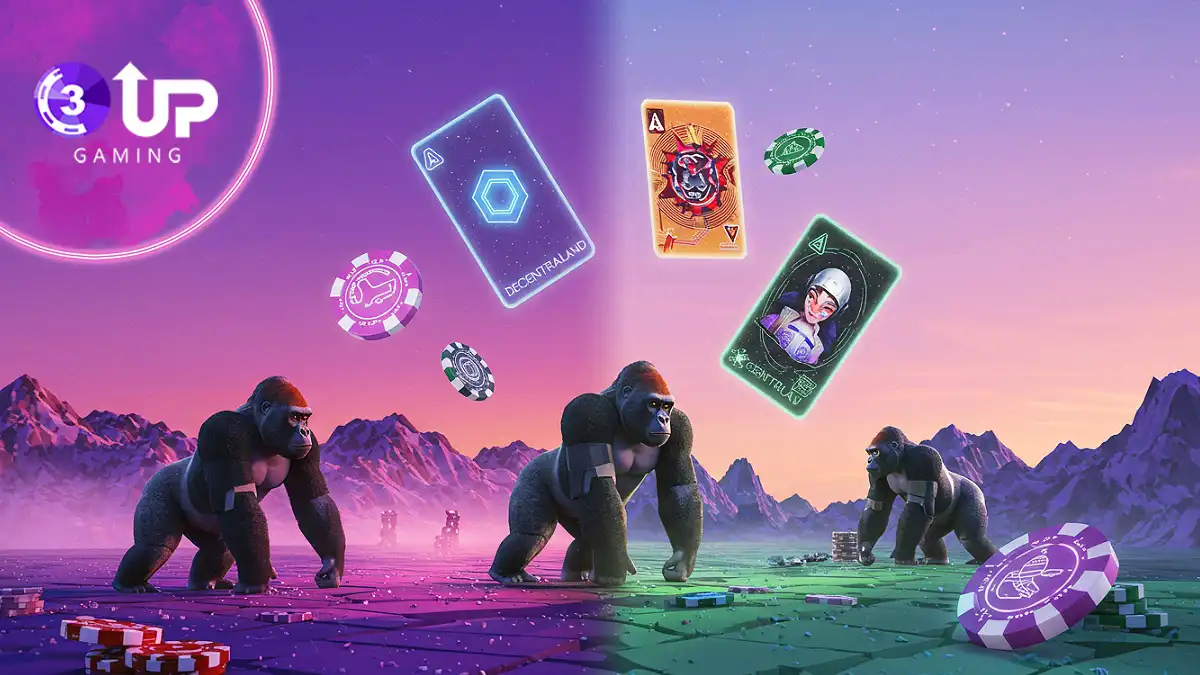
Poker NFT avatars are evolving from being mere visual properties to actually active participants of gameplay, economy, and identity. While the Web3 gaming industry continues to spread, various emerging themes are generating waves that affect the production, deployment, and availability of these icons – offering us a peek of the future of online poker in the decentralized environment.
This section covers two main areas: Dynamic NFTs (dNFTs) which change in game and Interoperable Avatars which enhance cross game and cross device presence. These two together are pointing to a world where poker is not just a game but an end to end skill, value and ownership ecosystem.
Dynamic NFTs and Skill Evolution
Dynamic NFTs (dNFTs) are also bringing poker avatars that change with the player. With on-chain metadata updates integrated, these NFTs can track changing attributes such as:
- Skill levels
- Win-loss ratio
- Staking record
- Tournament performance
This also opens up possibilities for merit based marketplaces, high stakes NFT tournaments and even sponsorships based on player performance. Poker NFTs are not static art, but dynamic representations of reputation with badges, power-ups and appearance evolution governed by smart contracts.
Interoperable Avatars in a Cross-Game Future
With the improvement in interoperability between blockchain protocols, the future is near when a poker NFT character can be used across various games and platforms. With standards like ERC-6551 (Token Bound Accounts) and identity layers like Lens Protocol or ENS, poker avatars will soon have:
- Shared inventory across poker games
- Universal rankings and profiles
- Cross-platform rewards and staking rights
This might introduce the “meta-poker pro” – a single character NFT for an individual that functions smoothly on Virtue Poker, Pokerverse, Decentraland, or even VR poker tournaments down the line.
Our following timeline is speculative and still reliant on blockchain scalability, gas fees solutions, as well as multi-protocol adoption, but it is worth the detour.
Roadmap to Integrating Poker NFTs in the Future
2024
Phase of Innovation: Standardization of NFT
Most Critical Features Launched: ERC-721/1155 NFTs as poker avatars
Player Impact: Cross-platform compatibility
2025
Innovation Stage: Smart Contract Growth
Key Features Released: Tournament logic, staking, and metadata update functionality
Player Impact: In-game skill development
2026
Innovation Stage: Dynamic NFTs (dNFTs)
Key Features Released: Skill-based NFT mutation and on-chain advancement
Player Impact: Reputation and value driven by players
2027
Innovation Stage: Complete Interoperability Layer
Key Features Released: Token Bound Accounts, universal ID layers
Player Impact: One identity for all poker ecosystems
2028
Innovation Stage: AI-Driven NFT Opponents & Co-Play Agents
Key Features Introduced: AI trainers/companions tied to NFT characters
Player Impact: Personalized gameplay and training
See how it compares: Benefits of Using the Poker Bot for Telegram!
Take control with: What Makes a Poker App Trustworthy in 2025?
FAQ: Poker NFT Characters Integrated into Web3 Games
1. What Is Web3 and How Does It Relate to NFT Poker Characters?
Web3 is all about decentralized identity and ownership. NFT poker avatars are digital avatars that each give you a unique, tradable and upgradable character for Blockchain poker players.
2. How Are Poker NFT Characters Integrated into Web3 Games?
All linked to wallets and smart contracts so real time interaction, skill building and identity attachment can occur in on-chain or interoperable game layers.
3. Can I Use My Poker NFT Character Across Different Games?
Yes, if they work together these are used. Many games allow cross-game usage through shared standards like ERC-721 and identity layers.
4. What Are the Advantages of Using NFT Characters in Web3 Poker Games?
You get ownership, tradability, skill progression, scarcity based rewards and more personalization than Charlie of Fortnite NFT gaming avatars.
5. Are There Any Risks in Using Poker NFTs in Web3 Games?
Risks include wallet loss, smart contract vulnerabilities and value volatility. Make sure you use secure platforms and always filter for contract integrity.
6. Which Blockchain Networks Are Popular for Poker NFT Integration?
Ethereum, Polygon, ImmutableX and BNB Chain are the leading networks with a robust developer ecosystem and NFT support.

